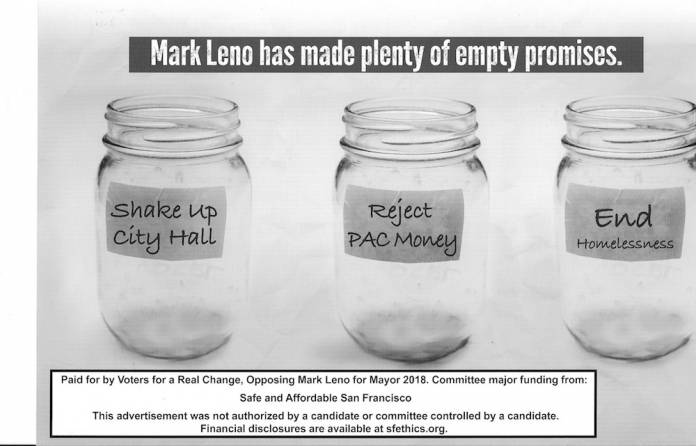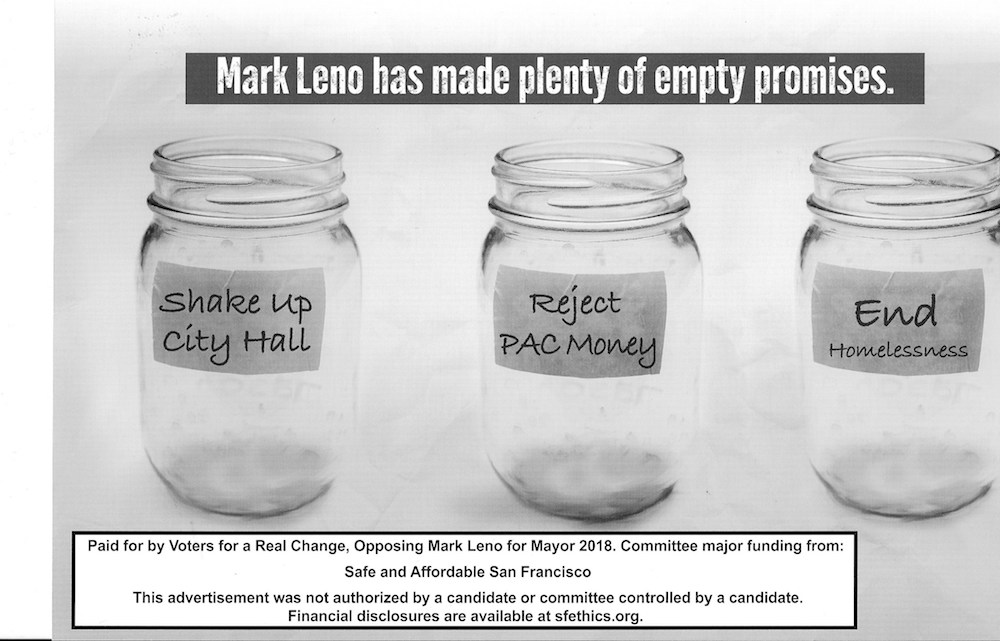
The first dark-money funded attack on Mark Leno dropped this week, just as the London Breed for Mayor campaign sought to increase its spending beyond the original limit – exposing a loophole in the ethics laws.
The mailer paid for by the secretive Voters for a Real Change, which is supporting Breed by attacking her opponents, accuses Leno of making “empty promises.”

Most of the money for this hit piece is funded by Safe and Affordable San Francisco – and since this is a “general purpose” state PAC, the situation is even worse that I originally reported. We won’t know who paid for the mailer – and this online ad – until July.
We can suspect, since we know who the major players funding the attacks on Leno and Kim are (mostly cronies of Ron Conwayand the real-estate industry.)
The message of the Leno hits is pretty simple: He’s making all sorts of promises, but he’s been in office a long time and has a record. That’s true – so do the other candidates. It’s pretty astonishing that only the Examiner has made any effort to report on what these politicians have actually done.
Here’s my fave: “Leno promised to end homelessness, but since Leno took office in 1998, homelessness has only gotten worse.”
Fact: Since London Breed first took office in 2013, homelessness has only gotten worse. For much of that time, she was president of the Board of Supervisors and a close ally of the mayor, who actually had the ability to do something about the evictions that were fueling homelessness.
Fact: Ed Lee – who the supporters of Breed loved and funded — was mayor from 2011 to 2018, and homelessness only got worse.
Help us save local journalism!
Every tax-deductible donation helps us grow to cover the issues that mean the most to our community. Become a 48 Hills Hero and support the only daily progressive news source in the Bay Area.
Fact: Every single supervisor and mayor who has been in office for more than a year has seen homelessness “only get worse.”
This is the best a high-powered, well-funded superPAC can do?
The odd thing about the whole situation: The Ethics Commission has determined that the fact that Breed supporters are spending money attacking Leno also gives Breed the right to break the spending limit and raise and spend more money for her campaign.
Here’s how the system is supposed to work: It’s city policy to encourage small donations and discourage big money in politics, so candidates for mayor who agree to a spending cap of $1.4 million get matching public funds for local donations.
But everyone knows it’s not fair for a candidate to be stuck with a spending cap when their opponent is awash in independent-expenditure committee support. So under the rules, if (as in this case) a superPAC spends $100,000 attacking Mark Leno, Leno gets to raise and spend an equivalent amount of his own. The message to the outside money is supposed to be: If you spend to attack a candidate, that candidate can get more money to fight back. So it might not be worth it.
Under the rules, the spending cap is lifted for Leno. His cap is now, based on pro-Breed IE spending, at $1.775 million.
But Breed has asked Ethics to allow her to also spend $1.775 million and to get another $69,000 in public funds toward that goal. And Ethics approved – because, you see, she has to keep up with Leno.
Even though Leno’s cap went up because of attacks on him by Breed’s supporters.
The message to the superPAC donors: Go ahead and spend all you want – in fact, all you are doing is allowing your candidate to spend more, too.
“It sounds totally backwards,” Pat Ford, a policy analyst at the Ethics Commission, told me. But, he said, that’s the law.
Sup. Aaron Peskin, who has written many of the city’s ethics laws, disagrees. “It’s an absolute misinterpretation of the law,” he told me. “I am totally blown away.”
If those are really the rules, then it might be time for new legislation that more actively discourages IE spending. “It’s totally twisted,” Leno told me. “And it needs to be fixed.”
One ethics watchdog, Larry Bush, has filed a complaint with the Ethics Commission about the dark money, citing local laws:
With voters already voting and only days before Election Day, the voters of San Francisco need to know the true source of a secret $100,000 contribution made to Voters for a Real Change, a newly formed independent expenditure committee with the explicit intent to attack a candidate in the race for mayor. The voters have a right to know who is pumping this last-minute funding into the race, which was funneled through Safe and Affordable San Francisco – ID# 1400471 (“secret committee”). Voters need this information in order to determine whether there has been a conspiracy among the donors and the committees to evade campaign disclosure laws, which require full transparency.
Specifically, we need to know if there are any violations of Section 85704 of the Government Code, which states:
“A person shall not make any contribution to a committee or candidate that is earmarked for a contribution to any other particular committee, ballot measure, or candidate unless the contribution is fully disclosed pursuant to Section 84302.”
Section 85704(b) further defines three clear circumstances which meet the earmarking threshold:
(1) The committee or candidate receiving the contribution solicited the contribution for the purpose of making a contribution to another specifically identified committee, ballot measure, or candidate, requested the contributor to expressly consent to such use, and the contributor consents to such use.
(2) The contribution was made subject to a condition or agreement with the contributor that all or a portion of the contribution would be used to make a contribution to another specifically identified committee, ballot measure, or candidate.
(3) After the contribution was made, the contributor and the committee or candidate receiving the contribution reached a subsequent agreement that all or a portion of the contribution would be used to make a contribution to another specifically identified committee, ballot measure, or candidate.
Ethics would have to move very quickly to come up with a ruling that would impact this race – and that’s the point: The dark-money donors want their candidate to win before anyone has a chance to figure out who they are and what they are up to.

